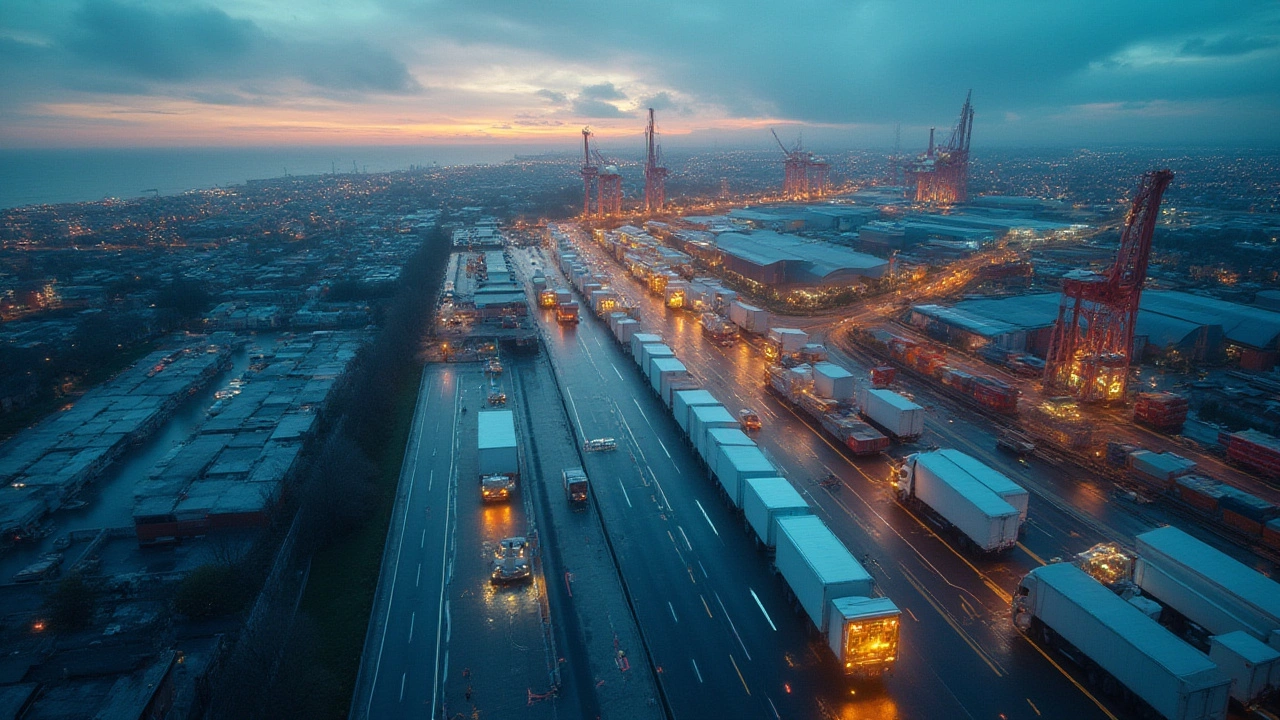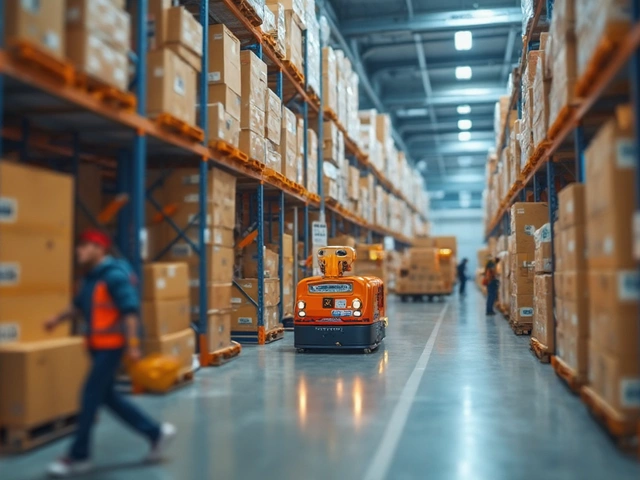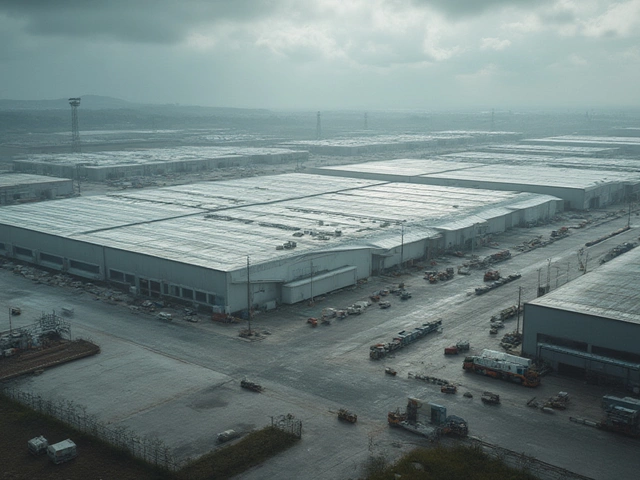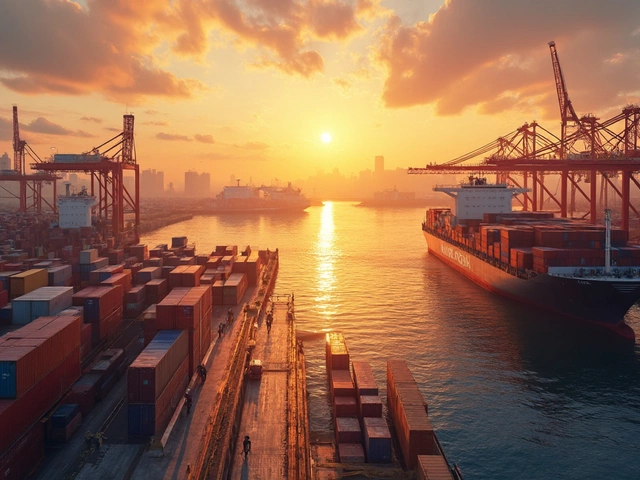Ask any kid today what a "logistics" company does, and you'll probably get a blank stare. Tell them it’s about moving stuff, and their eyes light up. But here's the thing—nobody in the industry wants to be called just a "logistics" provider anymore. The word feels old-school, weighed down by memories of dusty warehouses and scattered packages. These days, companies are racing to rebrand themselves with trendier, flashier titles—Smart Logistics, Supply Chain Management, Fulfillment Services, Integrated Solutions. Some even skip the word logistics entirely and call themselves "end-to-end supply orchestrators." The name isn't just about sounding cool; it's about showing how dramatically things have changed. If you think logistics is still just about trucks and storage, you haven't seen the full picture yet.
Why Logistics Got a Name Makeover
Think about the Amazon packages landing at your door less than a day after you click "Buy Now." Or the way grocery apps track your lettuce from farm to fridge. The classic logistics model—pile stuff in a warehouse, throw it on a truck, send it out—couldn’t keep up with everything we expect today. By 2020, a global study from Gartner showed that 80% of logistics heads believed their biggest competitors weren’t other delivery companies; it was giants like Amazon who mastered every link in the supply chain. That’s where the new names started popping up. Logistics companies wanted a title that matched their new tech upgrades, data-driven planning, and speed. They started calling themselves "Supply Chain Management" firms. That made sense in 2015. But now, with AI-powered routing, instant tracking, driverless trucks, and climate-smart networks, some firms ditched "supply" or "chain" for terms like "Smart Logistics," "Digital Freight Platforms," or even "Movement as a Service." It's like giving the industry a reboot.
Names matter, especially online. Logistics sounds old. Supply Chain Management hints at a big-picture thinker who can coordinate materials, information, finances, and nearly everything else. “Smart Logistics” is the big winner right now. According to a 2024 report from Deloitte, the use of "smart logistics" in industry job postings rose by 140% in a single year. TikTok creators and LinkedIn influencers preach about "integrated logistics ecosystems" and "logistics 4.0." It’s not just buzzwords—a name can attract new tech talent, woo investors, and signal to customers that you’re more than a shipping company. The big players—Maersk, DHL, XPO—have all rewritten their marketing language. Even old-school shipping lines, like the container giants on the Baltic Sea, now run ads for "Connected Supply Solutions." Everyone wants to avoid sounding like a relic.
What Does The New Logistics Include?
So, what is hiding behind all these shiny new names? Logistics isn’t just about moving things anymore. If you dig into the job descriptions (or spend a wobbly afternoon eavesdropping at a supply chain trade show—been there, and yes, it’s a weird crowd), you’ll hear that modern logistics covers nearly the entire journey of a product. That means every step from the first ingredient or part, all the way to the moment your kid rips open the box at home.
Here are some of the upgrades behind new logistics:
- Smart routing powered by real-time data: Carriers use software that checks traffic, weather, and even global news to pick the fastest, safest routes.
- AI demand forecasting: Tools now predict how many t-shirts, coffee beans, or phones you’ll want next month—so brands ship just enough, not too much.
- Automated warehouses: Robots pick and stack orders side by side with humans. Amazon’s Tallahassee center, as of 2025, has over 4,000 mobile bots. Human workers manage, tweak, and troubleshoot.
- Climate-aware supply chains: After those shocking 2022 energy price spikes, companies jumped into electric trucks, solar warehouses, and carbon tracking. Walmart cut their net delivery emissions by 20% since 2023. Even smaller courier services offer "green delivery upgrades."
- Real-time tracking: Now you can follow your order on a digital map, not just with a vague, "Item dispatched." Both customers and sellers obsess over these updates. There’s even a market for apps that let you slap a tracker on your moving van!
- Reverse logistics: Easy returns are a must. Logistics leaders now plan for returns as carefully as deliveries, using software to minimize waste and costs.
Every little tweak makes the process smarter, quicker, and more efficient. The word “logistics” just couldn’t keep up. Kids like Tobias, my son, never say, “Mom, guess what I learned about inventory optimization today!” But he does love when his lost schoolbook gets returned thanks to a "lost and found" network that depends on all these new smart tools keeping track of movement across the city.

Smart Logistics: Not Just a Fancy Name
The "smart logistics" term isn’t just for show. It points to a digital revolution reshaping the industry faster than most people realize. When people hear "logistics," they think of warehouses and trucks. But today, the show is run by data. In 2024, more than 60% of logistics spending in the US was on software, sensors, and automation—not physical trucks or buildings, according to the Council of Supply Chain Management Professionals.
Let’s talk about the players making the biggest moves. Flexport has turned international shipping into an app-driven, almost self-serve experience. ShipBob lets even small brands access Amazon-level fulfillment without huge warehouses of their own. UPS and FedEx have labs focused entirely on "hyper-optimization"—feeding billions of data points to tweak routes down to the minute.
All this "smart" stuff offers real benefits, even if you’re not moving containers across oceans. Here’s how:
- If you run an online shop, modern platforms can show how long it’ll take mailed orders to reach any customer—even surprise buyers in remote Alaska.
- Parents tracking a kid’s lost lunchbox can benefit from the same Bluetooth and RFID tracking techniques shipping warehouses use for high-value products.
- For job seekers, learning the basics of logistics tech—like warehouse management systems—opens doors. Demand for these roles continues to rise, with job boards showing up to 50% more postings for “logistics technology specialist” than in 2022.
Smart systems have also made “unexpected” efficient. After the giant canal blockage in 2021, a lot of logistics firms fast-tracked their automation plans. Deloitte’s yearly survey found that by mid-2023, about half of mature logistics operators had a plan for rerouting goods via AI in the event of a breakdown or global drama. That’s the digital, smart, responsive world everyone wants to signal with the new names.
Tips for Navigating the New Logistics Landscape
If you’re thinking “this is great, but I just want my package on time,” you’re not alone. Even for consumers and small business owners, keeping up with these changes can be overwhelming. Here are a few real-life tips for making the most of the new logistics era:
- Shop with retailers that let you track orders in real time. Transparent tracking—not just the usual "your item is on its way"—is the new industry standard, thanks to all this smart logistics tech.
- Ask about returns when you buy online. If a business boasts “instant returns processing” or “reverse logistics support,” there’s a much higher chance you’ll get quick, hassle-free refunds.
- If you sell online—even casually—check for fulfillment networks that offer easy integration with your website. Shopify, WooCommerce, even Etsy now link up with smart warehouse partners. These partnerships let you offer same-day or next-day delivery, a huge selling point.
- Parents: try Bluetooth trackers for backpacks, phones, or lunch boxes. They run on the same tech as smart inventory systems and save a lot of time (and drama) in the school office.
- If you’re job hunting, explore certificates in supply chain tech or courses in warehouse automation. Many community colleges added "digital logistics" tracks after 2023 because companies are short-staffed in these skills.
For anyone working in logistics, names matter because they show commitment to innovation. But as a customer, knowing what’s under the hood matters more. Push your providers to spell out exactly what their “smart” systems do for you. Logistics is now about anticipation—finding out what you’ll want, where you want it, and getting it there so smoothly you barely notice. And yes, that means your snow boots might land at your door in the dead of January thanks to data and predictive analytics, not just busy trucks.

What Might Be Next for the World of Logistics?
Here’s a wild prediction—by 2030, "logistics" will sound as quaint as "telegraph operator." Already, the hottest players are talking about “orchestration,” “ecosystems,” or “unified commerce delivery.” Some see a future where the division between virtual and physical goes away completely: every transaction, delivery, and return happens with one seamless line of code. Global studies by KPMG predict up to 70% of logistics firms will operate as “logistics platforms,” not just as movers of boxes, by the end of this decade. The people who started by moving packages are now software developers, analysts, and “customer experience” experts.
Oddly enough, the industry’s shift has even changed what kids dream about. When I ask Tobias what he wants to be, he’s more interested in inventing a flying delivery drone app than driving a truck. The new names for logistics show the field is bursting with tech, creativity, and astonishing speed. It’s not just about names—those are a reflection of an industry evolving right under our noses, faster than the boxes on our doorstep.





